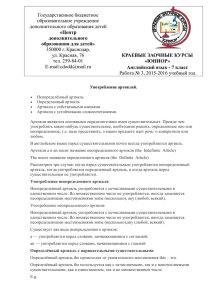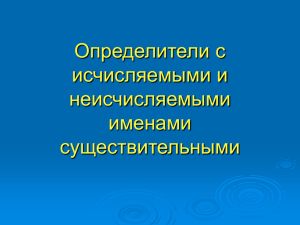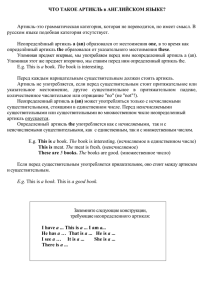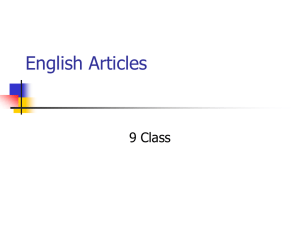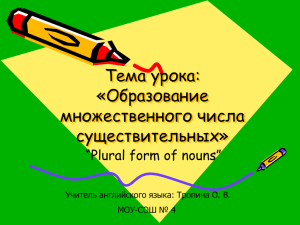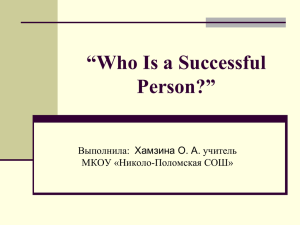Determiners in Russian
реклама
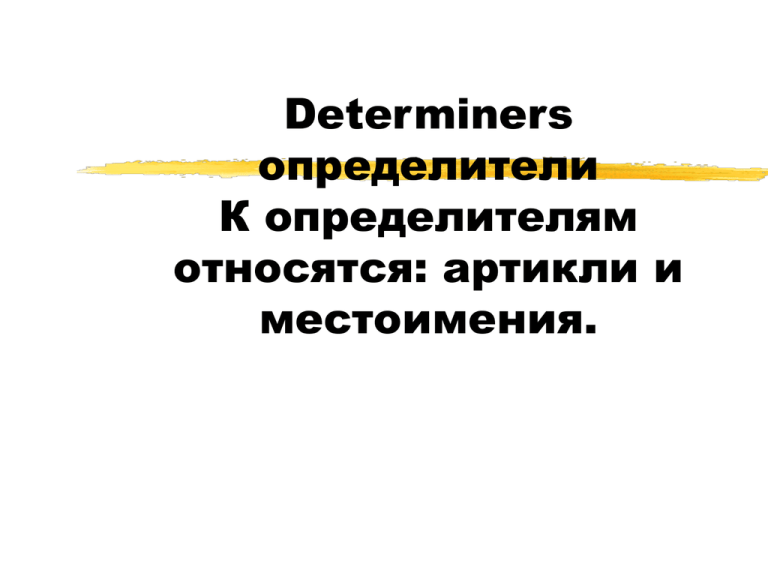
Determiners определители К определителям относятся: артикли и местоимения. 5.2 all (of), none of All(of) употребляется с неисчисляемыми существительными или существительными во мн.числе, когда имеется ввиду вся группа/ полное количество. All students have to work hard to get good grades. In some areas all water is polluted. Мы употребляем all or all of перед притяжательными местоимениями или the+noun: She ate all (of) her rice. All (of) the players are fit. Мы употребляем all of перед личными местоимениями в объектном падеже: My friend Lucy has five brothers and I’ve met all of them. He won the big prize in the lottery two years ago but lost all of it in horse races. None of употребляется перед личными местоимениями мн.ч.,притяжательными местоимениями и им. сущ. с опр. артиклем в значении «ни один из» Глагол может употребляться как в единственном так и во множественном числе: We tried to explain our problem to different people in the department but none of them treated us seriously. ! None не употребляется с глаголом в отрицательной форме. 5.3 another, other/the other, others/the others Another употребляется перед исчисляемыми сущ. в ед. числе со значением «еще один, другой»: Can I have anoter cup of coffeе? Would you like to try on another pair? Other употребляется как прилагательное перед существительным, когда говорится о людях или предметах в добавление к уже упомянутым ли известным: She never thinks about other people. Оthers употребляется как им. существительное Some people came on time, others were late. The other требляется как прилагательное перед исчис. сущ. в ед. и мн. числе в значении « не этот, второй”ли “другие оставшиеся, остальные из»: Manchester United played well but the other team wasn’t bad either. The others употребляется как существительное: A few players were quite good but the others were hopeless. Разница в употреблении the second и the other. Тhe other употребляется когда речь идет о двух предметах или лицах; the second –когда мы перечисляем предметы по порядку и их больше чем два: The first song was very lively, the second was a ballad, and the third one was a well-known dancing tune. One of Ann’s grandmothers is Spanish, the other in Brazilian. 5.4 both (of), either (of), neither (of) Both (of), either (of), neither (of) употребляются когда речь идет о двух предметах или лицах. Both всегда во мн.числе. Both shoes were old and worn out. Both come from large families. Both и both of употребляются перед притяжательными местоимениями и сущ. во мн. числе с артиклем the: Both (of) the twins have colds. Both of употребляется перед местоимениями в объектном падеже: I have an older brother. Both of us used to play basketball when we were at school Either и neither употребляются для обозначения двух людей или предметов в значении «любой из двух». Either употребляется с сущ. ед. ч.и утвердительной формой глагола: Either tool will open the window. Neither исключает оба предмета «ни один из них» Neither player deserves to win. Either of , neither of употребляются перед мест.во мн.ч. притяжательными мест или сущ мн.ч. с артиклем the: Both players are good.Either of them could win the competition. Neither of them is coming. 5.5 each (of) Each (of) «каждый» употребляется для обозначения двух или более людей или предметов, когда каждый из них понимается отдельно. Each всегда управляет глаголом в ед.числе: Each student has to buy the coursebook. Each postcard was lovely. Each (of) употребляется перед личными, притяжательными мест. и сущ. с артиклем the Each of us is responsible for it. Each (of) употребляется перед личными, притяжательными мест. и сущ. с артиклем the Each of us is responsible for it. Each of her books is about animals. Each of the players held the cup 5.6 a few (of), a little (of) A few и a little имеют одно и тоже значение «несколько,некоторое количество,немного». A few употребляется с исчисляемыми сущ. мн.числа: It wasn’t a big party; I invited jast a few friends. A little употребляется с неисчисляемыми сущ: There is a little соffee left. A few of ,a little of употребляются перед личными мест. В объектном падеже, притяжательными мест., и сущ. с артиклем the: A few of my friends brought presents. There’s a little of the cake left. 5.7 a lot (of), lots (of) A lot of употребляется с сущ. Во мн. Числе и с неисчисляемыми сущ. В значении «много»: The baby has a lot of toys. Do you drink a lot of fruit juice? Если a lot of употребляется с неисчисл. сущ., то глагол стоит в ед. числе: There is a lot of information on the Internet. Если a lot of употребляется с исчисл. сущ.мн.числа, то глагол стоит во мн. числе: A lot of films are produced in Hollywood. A lot может употребляться после глагола: He laughs a lot. Does he work a lot? Lots (of) имеет тоже значение что и a lot(of),но является неформальным по стилю: I had lots of presents on my birthday. Можно употреблять lots после глагола: Don’t give him any more cake - he’s had lots. 5.8 many (of), much (of) Many употребляется с исчисляемыми сущ. во мн. числе, а much пред неисчисляемыми сущ. в ед.числе в вопросах и отрицательных предложениях: I didn’t get many presents on my birthday. How much money do you need to buy a mountain bike? Many and much употребляются вустойчивых выражениях: too many, very many, too much, very much: There were too many people in the supermarket. Thank you very much. Many of и much of употребляется перед местоимениями во мн7 числе, притяжательными местоимениями или сущ. С артиклем the: Many of them like folk music. 5.9 more (of), most (of) More and most употребляются перед неисчисляемыми сущ. и сущ. во мн.числе: More people play football than tennis. Most rice is grown in Asia. More of и most of употребляются перед местоимениями и сущ. с артиклем the: Most of us want to be successful. Most of the people in the room are friends. 5.10 some (of), any (of), no Some, any или no употребляются перед неисчисляемыми сущ. и сущ. во мн. числе: There are some cakes left in the fridge. Do you have any news about Peter? There was no time to think. Some употребляются в повествовательных и вопросительных предложениях, ответ на которые подразумевается «Да»: I’ve met some nice people. Any (of) употребляется в общих вопросах и отрицательных предложениях с частицей not: Do you know any famous people? I can’t speak any of these languages. Any re. As two words it means ‘not more’ and we use it with a positive verb: I refuse to do any more washing up. As one word it means ‘not any longer’ and we use it with a negative verb: I’m not washing up anymore. We use some of and any of in front of pronouns, possessive adjectives and the+ noun: Some of you won’t need to buy a ticket. I haven’t read any of his books. No means the same as ‘not any’: I’ve got no problems at all. = I haven’t got any problems.
